Yo, devs. If you’re looking to step up your search game in 2024, listen up. AI search engines are where it’s at. We’re talking next-level discovering and exploring up in here. Sure, you know Bing and Google SGE. Old faithful. But the landscape is changing faster than a Tesla goes 0 to 60. We scoped out the six best AI search engines that need to be on your radar right now. From startups prioritizing privacy to ones with paid plans that got more queries than ChatGPT Plus. These bad boys are redefining the search experience with contextual results, killer interfaces, and answers that slap. Whether you wanna dive deep on a topic or just find stuff hella fast, these AI search hooks have you covered. We stan innovation ’round these parts, so we’re serving up the tea on exactly what makes each one fire. Let’s dive in and level up, shall we? Holla.

Introduction to AI Search Engines
AI-powered search engines are transforming how we find information on the internet. Instead of just matching keywords, they understand natural language and context to provide the most useful results.
Andi Search
Andi Search is an AI-based search engine focused on providing factual and trustworthy results. It uses a combination of technologies like large language models, knowledge graphs, and traditional search engines to understand complex questions and provide summary answers with sources.
Unlike Bing or Google, Andi incorporates AI throughout the entire search experience, not just at the top of the page. The visually engaging interface presents information with images, text, and options tailored to what you’re looking for. Andi aims to be more than just a keyword search by understanding the context and intent behind your questions.
For example, I asked Andi, “Who is the most skilled Jedi of all time in the Star Wars universe?” Andi provided a summary correctly identifying Ahsoka Tano as a candidate, with a link to the source article and options to show the full results or get a summarized answer. Andi is focused on giving factually accurate information from reputable public data sources.

Bing and Google
While Bing and Google are the most well-known search engines, their AI capabilities are limited to chatbots at the top of search results pages. They provide the familiar “10 blue links” below, relying more on keywords and popularity than truly understanding search intent.
Bing and Google also gather personal data to tailor results, raising privacy concerns. Andi Search and other AI alternatives aim to provide an unbiased search experience focused on factual information from public data sources.
For developers in 2024, AI search engines like Andi provide new opportunities to build knowledge graphs, question-answering systems, and other applications utilizing natural language understanding. As AI continues to advance, search engines focused on contextual understanding and presenting information visually will likely gain more prominence. But for now, Andi Search leads as an AI search engine providing factual, trustworthy results to help you explore the world’s knowledge.
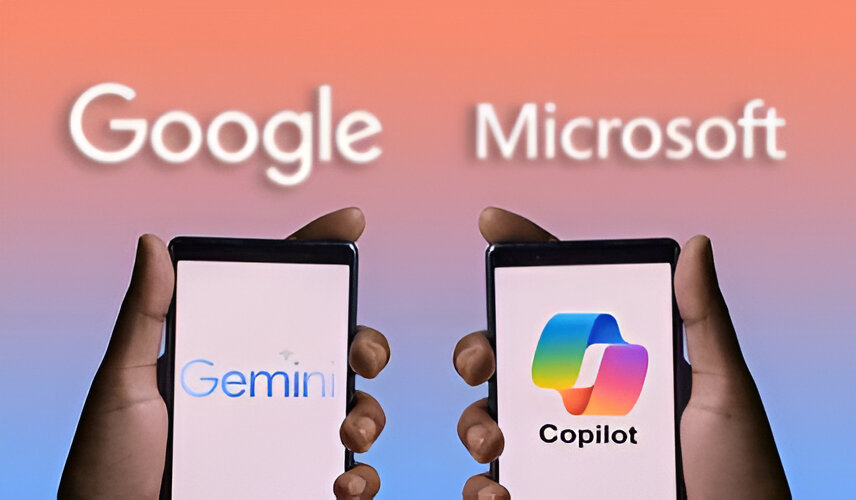
Google SGE vs Bing: The Giants of AI Search
When it comes to AI-powered search engines, Google SGE and Bing are the industry leaders. They’re the most popular, widely used options available today. However, while Google SGE and Bing share some similarities, there are a few key differences to be aware of:
Privacy and Data Use
Google SGE is known for tracking users and using personal data to target ads. Bing, on the other hand, claims to value users’ privacy more. Bing does not track you across the web or use your data for ad targeting in the same way Google SGE does. So if privacy is a concern, Bing may be a better choice.
Search Results
Google SGE is good at providing relevant results for common search queries. It uses AI and machine learning to understand the context behind users’ searches and provide helpful responses. Bing also provides good search results but may struggle more with complex, open-ended questions compared to Google SGE.
Image and Video Search
Both Google SGE and Bing offer image and video search functions. However, Google SGE’s image and video search tends to provide more relevant, higher-quality results compared to Bing. Google SGE is better at understanding the context of image and video searches to show the most useful content.
Additional Tools and Features
Aside from web search, Google SGE and Bing both offer additional tools like maps, news aggregators, shopping search, and more. Google SGE generally has a wider range of high-quality tools, from Google Translate to Google Flights to Google Scholar. Bing’s extra features are more limited.
Overall, while Google SGE and Bing are both solid AI-powered search options, Google SGE has a slight edge. It offers unparalleled search quality, a wider range of useful tools, and more advanced AI capabilities. However, if privacy is a top concern, Bing can be a good alternative. In the end, the right choice comes down to your needs, values, and personal preferences.
Top AI Search Engines Beyond Google and Bing
We all know Google and Bing, but what other AI-powered search options are out there? Quite a few. Some provide unique features that even surpass the big players. Here are three of the top AI search engines giving Google and Bing a run for their money.
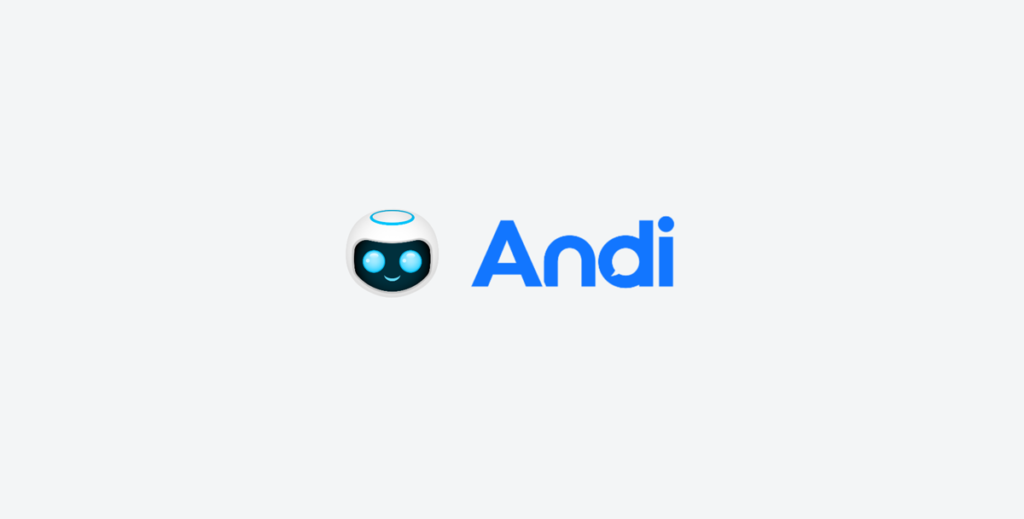
Andi Search
Andi Search is an AI search startup offering an innovative way to explore the web and gain knowledge. After using Andi for a while, you realize there is a better approach to presenting information than Google or Bing’s typical “10 blue links.”
Andi stands out for a few reasons:
- It uses AI throughout the entire results page, not just at the top like Google and Bing.
- Images, summaries, and options are provided in a contextual way that makes sense.
- All page elements work together to communicate the information you need.
Andi is more than a text-based search engine. It incorporates visuals since humans are highly visual beings. Using Andi shows that Google and Bing are essentially traditional search engines with an AI chatbot on top.
What is Andi AI Search? Andi is an AI search engine that provides trustworthy answers and avoids the hallucinations common in GPT-based apps. It offers keyword results, answers complex questions, and understands natural language.
Technology: Andi uses large language models, knowledge graphs, and Google/Bing (50% of the time).
Andi AI Search Results: I asked Andi a complex question and got a summary with a source link and options for full results or a question summary. The summary correctly answered my question, even determining if a fictional character was the most skilled Jedi.

Qwant
Qwant is a privacy-focused AI search engine based in France. It doesn’t track users or store IP addresses, locations, or search histories. Qwant’s algorithms and indexes are independent of any other search engine.
Qwant’s knowledge graph and semantic search provide relevant results. It has strong coverage of news, images, and videos. The “Social” tab within results shows trending discussions around search terms.
Qwant is available in over 20 languages and partners with independent media to provide local content. It’s a credible alternative for those concerned about privacy and unbiased results.

Wolfram Alpha
Wolfram Alpha isn’t technically a web search engine. It’s an AI-powered computational knowledge engine. You can enter complex questions, calculations, or data analyses and Wolfram Alpha provides expert-level responses by computing the answer from its vast data repositories.
Wolfram Alpha covers mathematics, statistics, chemistry, physics, astronomy, life sciences, history, geography, engineering, linguistics, music, cinema, and more. It’s used by students, engineers, scientists, programmers, and hobbyists needing high-quality computational knowledge.
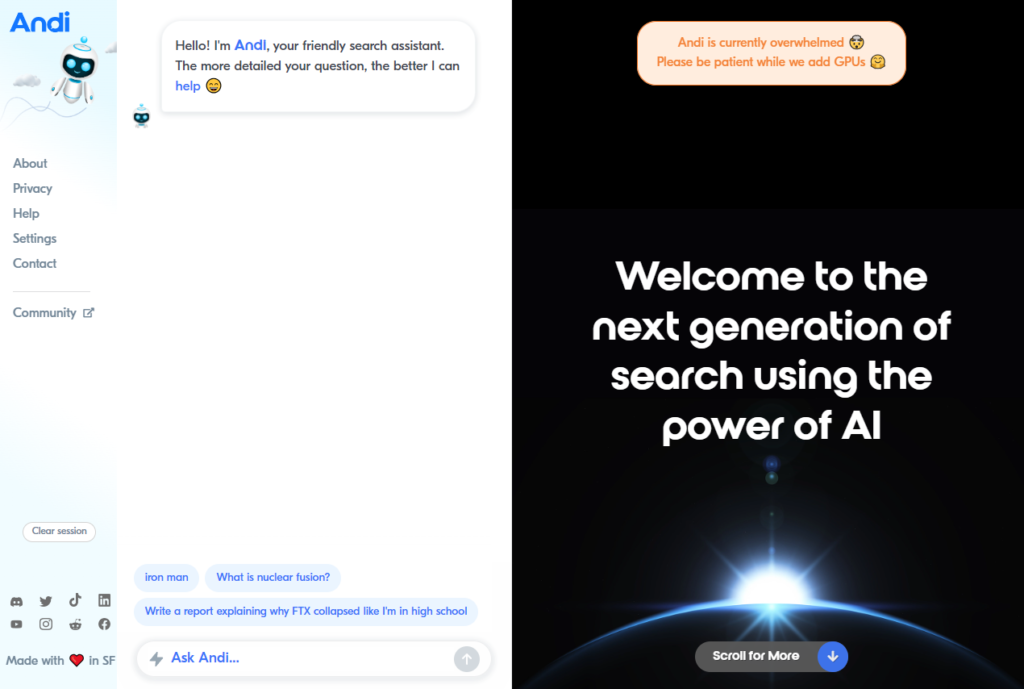
Andi Search – A Visual, Contextual AI Search Experience
Andi Search is an AI-powered search engine that provides a visual, contextual search experience. It goes beyond the traditional ten blue links and chatbot at the top of the page that Bing and Google SGE offer.
A Human-Centered Design
Andi Search was created with human needs and psychology in mind. We are highly visual creatures, so Andi incorporates images, graphics, and videos – not just text – into search results. The layout and options are designed to intuitively communicate the information you’re looking for.
After using Andi Search for a while, you start to realize there is a better way to explore the web and find answers. Bing and Google SGE seem stuck in the old paradigm of just listing links, while Andi creates an immersive experience.
Powered by Advanced AI
Andi Search utilizes a combination of technologies, including:
- Commercial and open-source large language models (LLMs)
- Knowledge graphs
- Bing, Google, and other search engines (for 50% of results in 2022)
The AI powering Andi is focused on providing factually accurate answers and avoiding the hallucinations that can come from generative models like GPT-3.
Complex, Multi-Part Answers
I asked Andi a complicated question with multiple parts. The summary response correctly answered all aspects of my question, even determining whether a fictional character was the most skilled of all time based on available information.
Andi Search then gave me the option to see the full search results or get an expanded summary response. The combination of visual elements, natural language understanding, and knowledge-based answers makes Andi Search an exciting alternative to traditional search engines. If you’re a developer looking to build AI into your products, Andi’s API and SDKs are worth exploring.
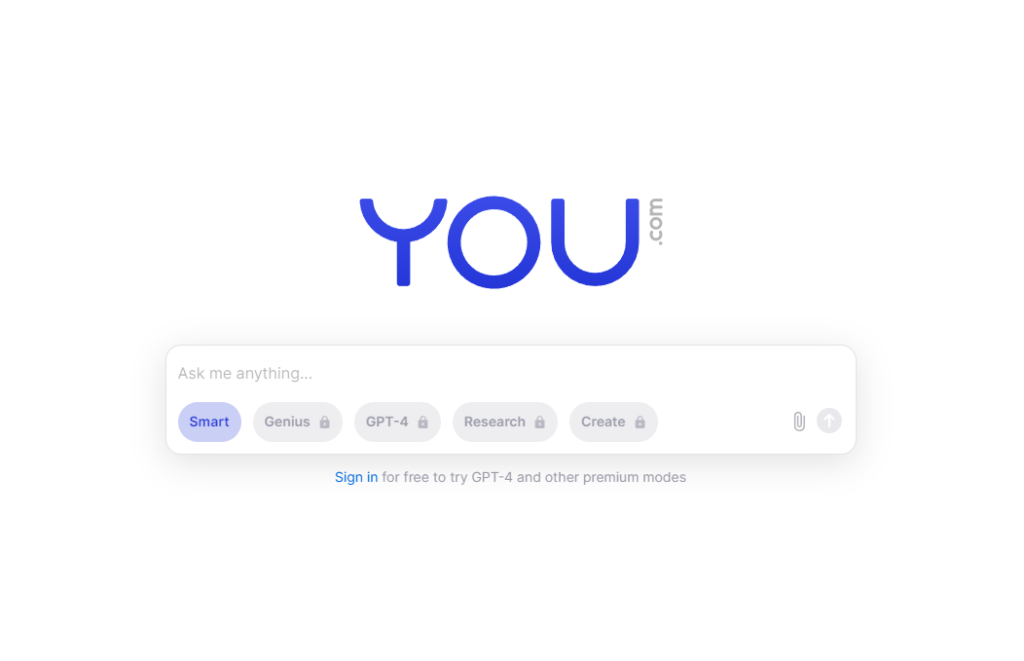
You.com – A Private AI Search Engine
You.com is an AI-powered search engine focused on privacy. If you value your privacy and don’t want your search queries and results tracked, You.com is worth considering.
Privacy-Focused Searching
You.com does not store your IP address or track your searches. It deletes your search history and personal information as soon as your search session ends. You.com also does not use tracking cookies or sell your data to third parties.
Customizable SafeSearch
You.com offers customizable SafeSearch filtering so you can filter out explicit images, videos, and websites. You choose from three levels:
- Moderate – Filters sexually explicit content.
- Strict – Also filters profanity and violence.
- None – No filtering.
This is useful if children are using the device or if you want to avoid questionable content.
Useful Features
Some useful features of You.com include:
- Image search – Search for images on the open web or licensed stock photos.
- News Search – Search for trending news stories or by topic. News results link to reputable publishers.
- Video search – Search for informational videos, tutorials, reviews, etc. Video results are filtered based on your SafeSearch settings.
- Web search – You.com’s core feature. Search the open web for information on any topic.
- Dictionary – Quickly look up words to find definitions, synonyms, and related terms.
- Calculator – Basic calculator for quick math calculations.
- Unit converter – Convert between units of measurement for distance, volume, currency, and more.
- Weather – See current weather conditions and forecasts for locations around the world.
Summing It Up
You.com is ideal if you value privacy and control over your search experience. It offers useful tools and features with the option to filter explicit content. However, its index may be smaller than major search engines, and results can sometimes seem limited. But for private, family-friendly searching, You.com is a great choice.
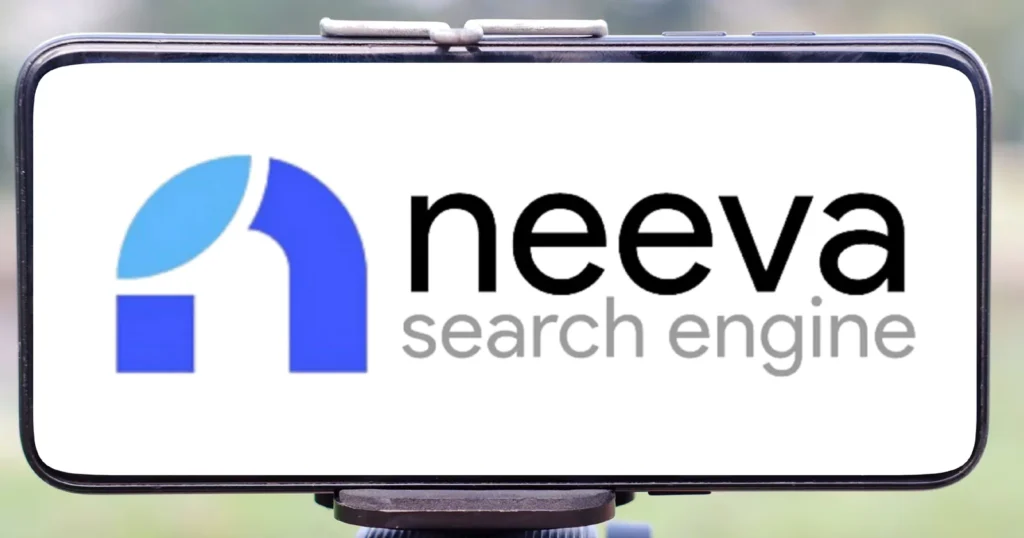
Neeva – Ad-Free Search Focused on Quality Content
Neeva is an AI-powered search engine that puts privacy, transparency, and quality content first. It was created by former Google engineers who wanted to build a better search experience without ads and user tracking.
If you’re tired of sifting through pages of ads and sponsored content on Bing or Google SGE to find the information you need, Neeva may be for you. This ad-free search engine focuses on delivering high-quality, credible results from vetted publishers and sources.
How Neeva Works
Neeva uses a combination of machine learning algorithms and human curation to provide relevant search results. Their engineers have developed ranking models that prioritize authoritative, fact-checked content over clickbait or thinly sourced material.
Neeva also has a team of researchers and librarians who evaluate sources and add high-quality publishers and domains to their index. They even allow users to suggest sites to be included or removed.
All of this results in search results you can trust and that aren’t trying to sell you anything. Neeva doesn’t have any sponsored content or ads, so you’ll never see promoted items at the top of the results page or interspersed throughout.
Privacy-Focused
Neeva does not track users or sell personal information to advertisers. They have a strict no-tracking policy and do not store IP addresses or unique identifiers. Your search history and personal data remain private.
For many, this alone is reason enough to switch to Neeva. In an age of increasing concern over how tech companies are using people’s data, Neeva offers a refreshing amount of transparency and control.
Plans and Pricing
Neeva offers a free version of its search engine, as well as a paid subscription plan called Neeva Premium. The premium plan provides an ad-free experience across more of the web by blocking ads and trackers on many partner sites and services. Premium subscribers also get early access to new features.
If you’re looking for an AI-powered search engine that puts your needs first, Neeva is worth a try. By focusing on quality over quantity and user privacy over profits, they are redefining what a search engine can be. Check them out and see the difference for yourself.
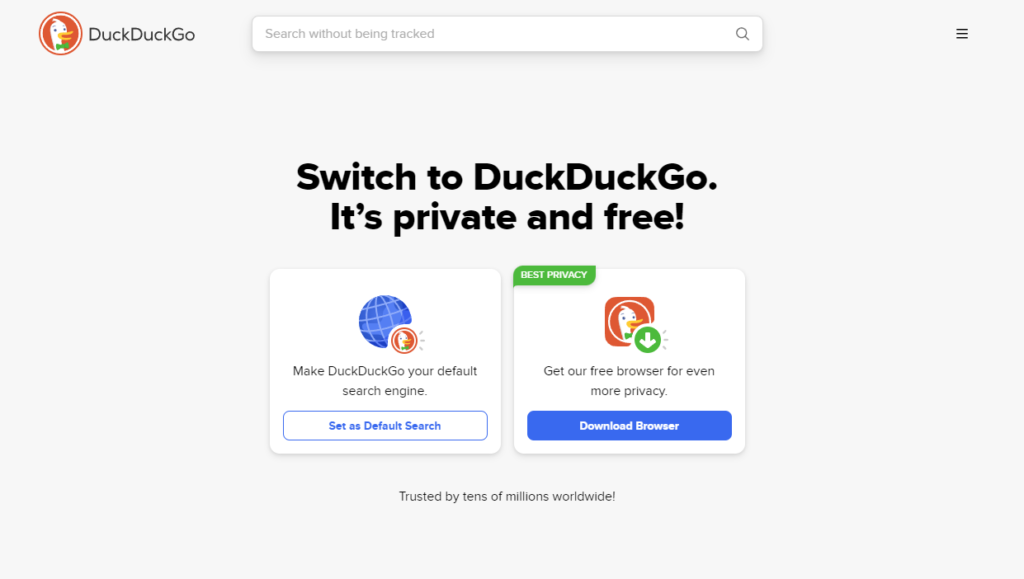
DuckDuckGo – The Privacy-Focused AI Search Engine
If privacy is a top concern in your search engine, DuckDuckGo is an excellent choice. Unlike Google and Bing, DuckDuckGo does not track users or store IP addresses, search history, or personal information.
DuckDuckGo is an independent search engine based in the U.S. that does not store users’ personal information or search history. It blocks hidden trackers and avoids filtering results or bubbling to provide an unbiased search experience. DuckDuckGo’s search results are powered by over 400 sources, including Bing, Yahoo, Yandex, and its web crawler.
How DuckDuckGo Protects Your Privacy
DuckDuckGo does not store your IP address, search history, or any personal information. It also blocks third-party trackers embedded on websites to prevent tracking across the web. Some of the ways DuckDuckGo protects your privacy include:
- It does not store your personal information or IP address.
- It does not track your search history or build personal profiles of users.
- It blocks hidden third-party trackers to prevent tracking across websites.
- It does not filter results or bubbles based on your search history.
- It generates anonymous search metrics and reports to improve its service.
Using DuckDuckGo
Using DuckDuckGo is very similar to using other search engines. You simply enter your search terms into the search box at duckduckgo.com, and the results are displayed on the page. Some tips for using DuckDuckGo effectively:
• Use natural language for the best results. For example, search “how to change a tire” instead of just “change tire.” • Use quotes for exact phrase matching. For example, search “Abraham Lincoln quotes” to find results containing that exact phrase.
• Use the! bang syntax to search other sites directly. For example, !g for Google, !w for Wikipedia, !yt for YouTube, etc. • Use the dropdowns and filters on the left to narrow results by topic, period, domain, etc. • Check out the Instant Answers at the top of the results for quick facts, calculations, definitions, etc.
DuckDuckGo is a solid private search alternative if you’re looking to avoid personal data collection and tracking. While the search results may not always match Google, DuckDuckGo continues to improve its algorithms and source new datasets to provide the most relevant results possible while maintaining strict privacy standards.
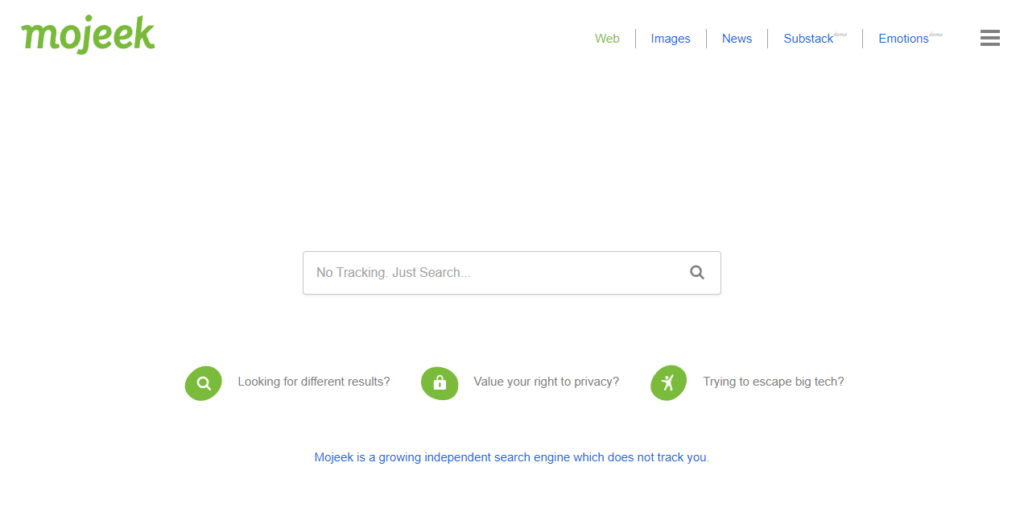
Mojeek – The Independent AI Search Engine
If privacy and independence from big tech are priorities in your search engine, Mojeek should be at the top of your list. Mojeek is an independent search engine based in Ireland that does not track or store users’ personal information.
Focus on Privacy
Mojeek does not store IP addresses or use tracking cookies, so your searches remain private. Mojeek also does not store or share any personal information with third parties. Compared to Bing and Google SGE, which collect vast amounts of data about users and their search habits, Mojeek is a breath of fresh air for those concerned about privacy.
Alternative Search Results
Mojeek also provides an alternative to the search results of the major engines. Because Mojeek has its own web index and ranking algorithms, the search results you get are quite different from Bing, Google SGE, or other mainstream search engines. Mojeek aims to surface high-quality, authoritative web pages in its results instead of just the most popular sites. ###Customization Options
For power users, Mojeek offers customization options to fine-tune results. You can adjust factors like the freshness of pages, and whether to include or exclude certain file types, domains, or content. Mojeek also has over 20 language interfaces so you can search in the language of your choice.
A Non-Profit Model
Unlike the major search engines that are focused on profits and advertising, Mojeek operates on a non-profit model. Mojeek believes that search engines should operate in the public interest rather than for commercial gain alone. By using Mojeek, you support an independent search engine that puts users first.
Overall, if you’re looking for an alternative to the search engines operated by tech giants, Mojeek is a solid choice. With its focus on privacy, high-quality results, and independence, Mojeek provides a distinctly different search experience than what you’ll find elsewhere. For developers and others concerned about privacy, Mojeek is a search engine worth checking out.
FAQs on AI Search Engines for Developers
As a developer, you likely have many questions about the top AI search engines and how they can benefit you. Here are some of the most frequently asked questions and answers:
An AI search engine utilizes artificial intelligence and machine learning to improve the search experience. AI search engines understand natural language queries, provide direct answers, show images and summaries, and even suggest related queries. The results are personalized based on your search history and tailored to your needs.
Traditional search engines like early versions of Google and Bing rely primarily on keywords to retrieve a list of blue links. AI search engines tap into massive datasets and neural networks to understand the meaning and context behind your queries. They provide direct answers, images, videos and other media within the search results. AI search engines continue to learn and improve over time based on interactions.
The two most popular AI search engines currently are:
• Google SGE (Search Generative Experience): Google’s AI-powered search engine. It provides featured snippets, knowledge panels, and recommended related searches.
• Bing: Microsoft’s search engine uses AI to provide visual answers, related images and suggestions for refining your search. Bing has grown more competitive with Google SGE in recent years.
As a developer, AI search engines can save you time and help you work more efficiently. Some of the key benefits include:
• Quick answers to coding questions: Get direct answers to queries about programming languages, frameworks, and troubleshooting issues.
• Summarized documentation: AI search engines provide summaries, code snippets, and examples from documentation and tutorials. No need to sift through pages of docs.
• Recommended tools and libraries: AI search engines suggest open source tools, libraries, and other resources based on what you’re building. They have a sense of what technologies work well together.
• Inspiration for new projects: See examples of what other developers have built to spark ideas for your own projects. AI search engines surface innovative and trending projects.
• Staying up-to-date with new technologies: AI search engines learn about the latest programming languages, frameworks, and developer tools as soon as they’re released. They make it easy to discover what’s new and keep your skills sharp.
Does this help explain AI search engines and how they can benefit you as a developer? Let me know if you have any other questions!
Conclusion
And there you have it – our roundup of the top six AI search engines for developers in 2024 that are pushing the boundaries of search technology. While Bing and Google SGE may still reign supreme, don’t sleep on these contenders. Each brings its spin, be it a privacy focus, curated results, or generous queries.
When leveraged properly alongside stalwarts like good ol’ Google, these next-gen search tools can seriously upgrade your development workflow. Do some test drives and see which ones mesh with how your brain tackles problems. We think you’ll be pleasantly surprised at just how far we’ve come from the days of slogging through pages of blue links. The future is here and it’s powered by AI. Happy searching!



















